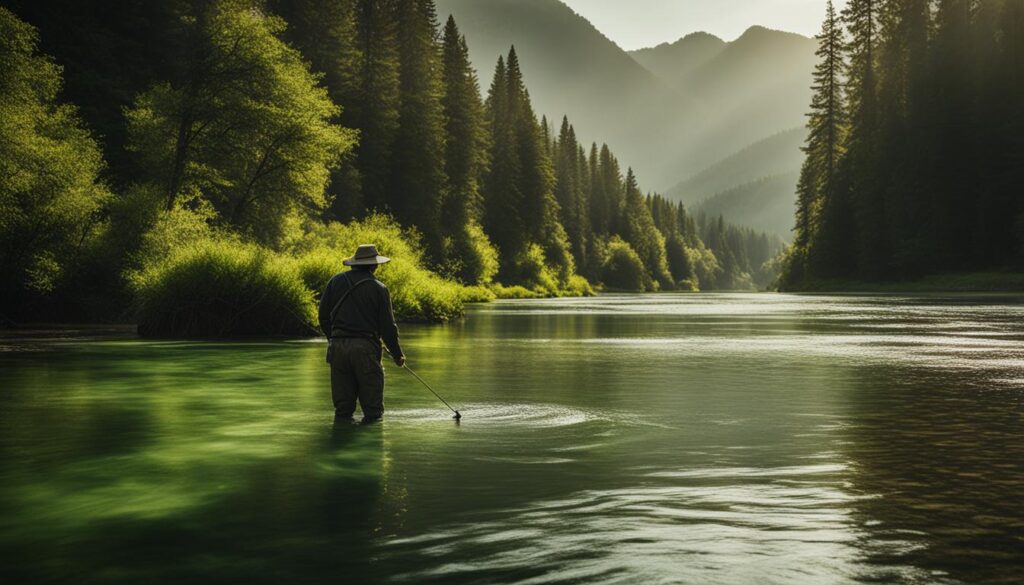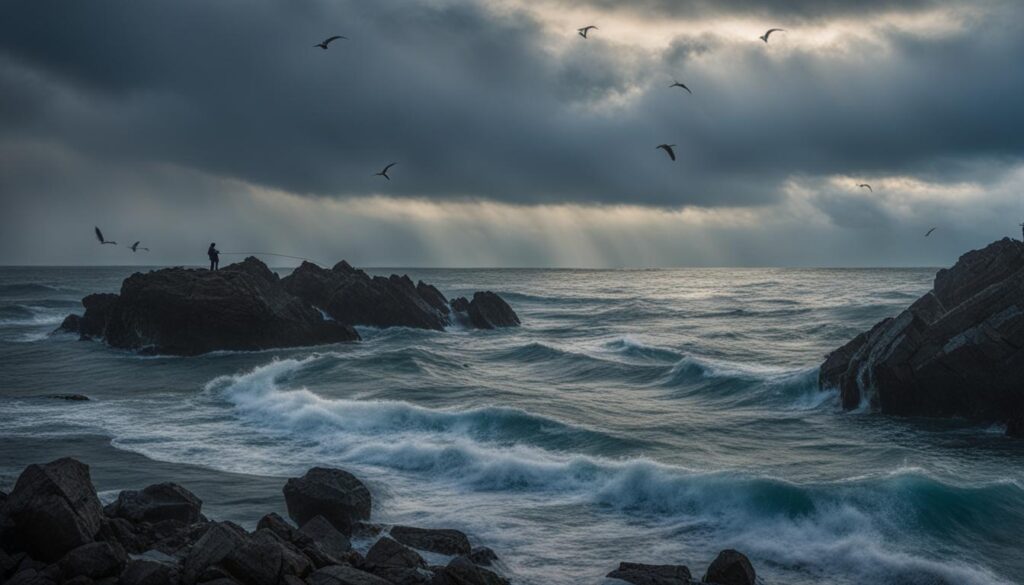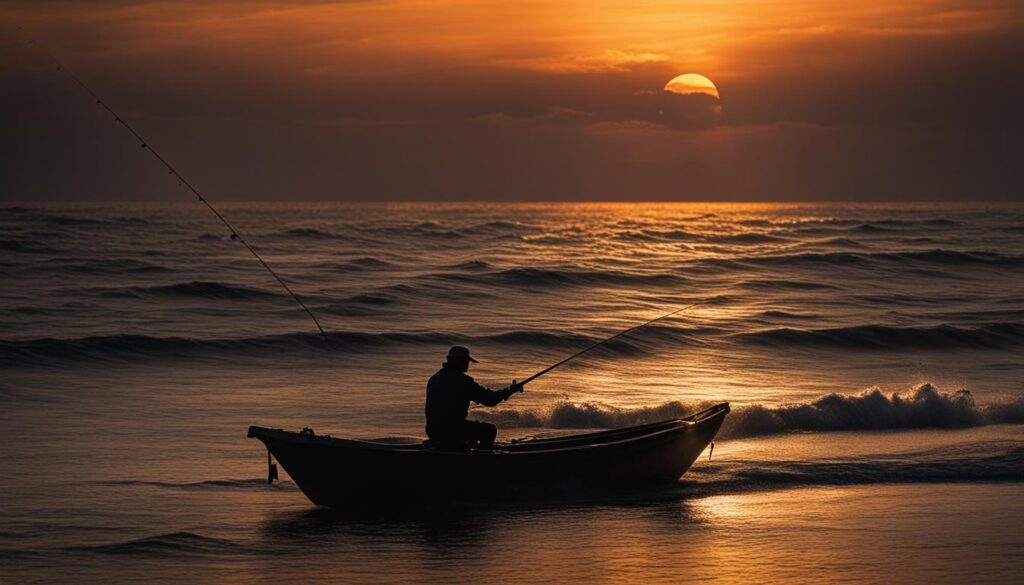We may earn money or products from the companies mentioned in this post.
Whether you are a seasoned angler or a beginner, it is essential to understand the importance of fishing etiquette and ethics. Proper fishing manners and ethical practices can make a significant impact on preserving fishing habitats and creating an enjoyable experience for everyone involved.
In this guide, we will cover everything you need to know about fishing etiquette and ethics. From understanding the different aspects of angling etiquette to ensuring responsible fishing practices, we will provide you with practical tips and guidelines for enhancing your fishing experience while showing respect for nature and fellow anglers.
Key Takeaways:
- Fishing etiquette and ethics are crucial for preserving fishing habitats and creating an enjoyable experience for all anglers.
- Angling etiquette includes respecting fishing spots, following catch-and-release practices, and maintaining proper behavior on the water.
- Responsible fishing involves practicing ethical angling, preserving fish habitats, and considering the long-term effects of our actions on the environment.
- Fishing guidelines for sustainable fishing include appropriate gear usage, catch limits, and leaving no trace behind.
- Showing respect and common courtesy to other anglers involves giving space, avoiding overcrowding, and communicating effectively while sharing fishing spots.
Understanding Fishing Etiquette
As an angler, it’s essential to understand the proper fishing etiquette to maintain a respectful and enjoyable atmosphere for all. Fishing etiquette is all about showing respect to the environment, fellow anglers, and the fish themselves. Here are some guidelines to follow:
Respect Fishing Spots
If someone is already fishing in a specific area, it’s essential to give them space and avoid overcrowding. When choosing a spot to fish, avoid disturbing other angler’s lines or interfering with their fishing experience. It’s always a good idea to ask for permission before fishing in a private spot or on land that’s not designated for fishing.
Follow Catch-and-Release Practices
Catch-and-release practices are crucial for maintaining healthy fish populations and should always be followed unless the fish is to be consumed. When releasing a fish, handle it with care and quickly return it to the water. Avoid taking the fish out of the water for too long, as this can lead to stress and injury.
Maintain Proper Behavior While on the Water
While on the water, maintain a respectful and courteous attitude towards other anglers. Avoid using foul language, making excessive noise, or littering. If you’re bringing a boat, be mindful of the wake you create and avoid damaging the shoreline or disturbing other wildlife.
By following these basic guidelines of fishing etiquette and angling etiquette, you can help create a pleasant and respectful environment for everyone involved in the fishing experience. Not only that, but you’ll also be contributing to the preservation and protection of the fish and the environment for future generations.
Fishing Ethics: The Importance of Being Responsible
Fishing is a popular activity enjoyed by millions around the world. As anglers, it is important that we conduct ourselves with the utmost respect for nature and our fellow fishermen. In this section, we will discuss the importance of fishing ethics and how responsible fishing practices help preserve the ecosystem and ensure the activity remains sustainable for years to come.
What is Fishing Ethics?
Fishing ethics refers to the moral principles and values that govern an angler’s conduct while fishing. It encompasses everything from respecting the fish and their habitat to abiding by the rules and regulations set forth by governing bodies. Ethical fishing practices are essential for the long-term survival of the sport and the environment, ensuring that we can continue to enjoy fishing for generations to come.
The Significance of Responsible Fishing
Responsible fishing involves taking measures to minimize our impact on the environment and the fish we catch. This includes practicing catch-and-release techniques, using barbless hooks to reduce harm to the fish, and avoiding overfishing or depleting a local fish population. Additionally, anglers must always adhere to the laws and regulations put in place by governing bodies to ensure the sustainability of the ecosystem. By following responsible fishing practices, we can preserve the environment for future generations and maintain a healthy ecosystem for both fish and wildlife.
Preserving Fish Habitats
Anglers have a responsibility to ensure they do not damage or disrupt the habitats of the fish they catch. This includes avoiding fishing in protected areas or areas where fish may be spawning or nesting. It is equally important to dispose of fishing lines, hooks, and other debris properly to prevent harm to wildlife and their habitats. When fishing in a shared location, fishermen should also strive to keep the area clean and be respectful of other anglers, avoiding overcrowding and following the etiquette guidelines outlined in the previous section.
Promoting Sustainable Fishing Practices
| Sustainable Fishing Practices | Unsustainable Fishing Practices |
|---|---|
| Practicing catch-and-release techniques | Keeping every fish caught |
| Using barbless hooks to minimize harm to fish | Using barbed hooks that cause more damage to fish |
| Fishing within catch limits and avoiding overfishing | Taking more than the allowed limit or depleting a local fish population |
The above table highlights some sustainable and unsustainable fishing practices. By following the sustainable practices outlined, fishermen can help promote a healthy and thriving ecosystem for fish and wildlife. It is equally important to educate others on the importance of sustainable fishing practices, including children, to ensure the next generation practices responsible and ethical angling techniques.
Fishing Guidelines for Sustainable Fishing
When it comes to fishing, practicing responsible and ethical angling is critical not only for the well-being of the environment but also for ensuring the longevity of the sport. To do so, it’s essential to follow certain guidelines that promote sustainable and responsible fishing practices. Here are some fishing guidelines to keep in mind:
| Guideline | Description |
|---|---|
| Choose the right gear | Using the appropriate gear and techniques can prevent unnecessary damage to fish and their habitats. Make sure your gear is suitable for the type of fishing you’re doing and consider using barbless hooks. |
| Know the regulations and catch limits | It’s crucial to understand the fishing regulations in your area, including catch limits, size limits, and protected species. Follow these regulations to avoid harming fish populations and preserve the ecosystem. |
| Practice catch-and-release | When possible, practice catch-and-release techniques. This approach involves releasing the fish back into the water after catching it, reducing the impact on the fish populations and allowing them to reproduce and grow. |
| Handle fish with care | When handling fish, ensure that your hands are wet and handle the fish gently to avoid causing harm. If you must remove the hook, use pliers or other appropriate tools and return the fish to the water as soon as possible. |
| Leave no trace | It’s crucial to leave the fishing spot as you found it. Avoid leaving any trash or debris behind and pack out all your waste, including fishing lines and hooks. |
Following these fishing guidelines can help ensure that we’re practicing sustainable and ethical fishing practices. Remember, responsible fishing is not only crucial for the environment but also for maintaining the longevity of the sport for future generations.
Respecting Fellow Anglers: Common Courtesy on the Water
While fishing can be a solitary activity, it’s not uncommon to share the water with other anglers. It’s essential to practice proper fishing etiquette and show respect to fellow anglers to ensure a pleasant and enjoyable fishing experience for everyone involved.
Give Space
When fishing in close proximity to other anglers, it’s crucial to give each other enough space. Cast your line away from others, so you don’t accidentally hook anyone or their lines. Suppose the water is particularly crowded, and there’s limited space to move around. In that case, it’s essential to communicate effectively and coordinate your movements with those around you to avoid any conflicts.
Avoid Overcrowding
Respect other anglers’ personal space and do not crowd them. It’s important to give people enough room to fish comfortably and move around easily. Overcrowding can lead to a tense and uncomfortable fishing experience for everyone involved, and it’s crucial to be mindful of others and their fishing space.
Communicate Effectively
Clear and concise communication is key to avoiding conflicts on the water. When sharing a fishing spot with others, it’s essential to communicate your intentions and respect other anglers’ needs. For example, if you’re planning to leave soon, let others know so they can plan their fishing accordingly.
“Effective communication allows for a shared understanding of expectations and can prevent misunderstandings on the water. It’s never a bad idea to have a friendly conversation with your fellow anglers and get to know them a little better.”
Be Respectful
Respecting other anglers means being mindful of their needs and keeping any loud noises or disruptions to a minimum. Avoid playing loud music, shouting, or engaging in any behavior that might disturb others. Treat others as you would like to be treated, and always be courteous and polite.
Teaching the Next Generation: Instilling Fishing Ethics in Children
The future of fishing lies in the hands of our children. As parents and guardians, it’s our responsibility to teach them about the importance of fishing ethics and responsible practices. Not only will this ensure the longevity of the sport, but it will also instill valuable lessons about respecting nature and wildlife.
Here are some tips for teaching children about fishing ethics:
- Lead by example: Children learn by observing their parents and role models. By practicing ethical fishing practices yourself, you’re setting a positive example and reinforcing the importance of responsible angling.
- Start small: Introduce children to fishing gradually, starting with simple techniques and equipment. Teach them about catch-and-release practices and proper fish handling, emphasizing the importance of treating fish with care and respect.
- Encourage curiosity: Teach children about different fish species, their habitats, and their importance in the ecosystem. Encourage them to ask questions and explore the natural world around them.
- Emphasize the bigger picture: Teach children about the long-term effects of pollution, overfishing, and other threats to aquatic habitats. Help them understand how their actions can make a difference in preserving and protecting our natural resources.
- Maintain safety: Teach children about the importance of safety while fishing, including the use of appropriate safety gear and the dangers of fishing near moving water or during inclement weather.
By instilling fishing ethics and responsible practices in our children, we’re ensuring a sustainable future for the sport we love. Not only that, but we’re also teaching valuable lessons about respect, responsibility, and environmental stewardship.
Enhancing Your Fishing Experience Through Ethical Practices
Fishing can be an incredibly rewarding experience, both for the thrill of the catch and the opportunity to explore the great outdoors. However, it’s important to remember that as anglers, we have a responsibility to practice ethical fishing practices to help preserve the environment and its inhabitants for future generations.
By following these tips, you can enhance your fishing experience while also contributing to the sustainability of our natural resources:
- Practice proper fish handling: When catching and releasing fish, it’s important to handle them with care to avoid injury and stress. Use wet hands or gloves to handle the fish gently and release them quickly to minimize their time out of the water.
- Use barbless hooks: Barbless hooks can help minimize harm to fish and make it easier to release them quickly and safely. Consider using barbless hooks on your next fishing trip.
- Promote conservation efforts: Get involved with organizations that focus on the preservation of fish and their habitats. You can also participate in litter cleanups near fishing areas to help maintain a clean environment.
- Respect catch limits: Be knowledgeable about the regulations in your fishing area and follow catch limits to help ensure that fish populations remain healthy.
- Leave no trace: When fishing, make sure to pack out all of your trash and leave the area just as you found it. This helps minimize the impact of human activity in the environment.
- Consider the long-term effects: Before engaging in a fishing practice, consider the potential long-term impact on the environment. Is the method sustainable? Will it contribute to the depletion of a fish population? These questions can help guide your ethical decision-making while fishing.
By practicing these ethical fishing tips, you can enjoy a fulfilling and responsible fishing experience. Remember, as anglers, we have a responsibility to preserve the environment and protect the species we love to catch.
Conclusion
In conclusion, fishing etiquette and ethics are essential to ensure a sustainable and enjoyable fishing experience for all. By following the guidelines discussed throughout this article, we can preserve fish habitats, respect fellow anglers, and consider the long-term effects of our actions on the environment.
Practicing responsible fishing and ethical angling requires us to show common courtesy on the water, follow catch-and-release practices, and leave no trace behind. We must also teach the next generation about the importance of respecting nature and instilling fishing ethics in children.
By enhancing our fishing experience through ethical practices such as proper fish handling, using barbless hooks, and promoting conservation efforts, we can become better anglers and stewards of our natural resources.
In summary, fishing etiquette and ethics are fundamental to enjoying our sport while preserving our natural resources. Let’s continue to follow these guidelines and promote responsible and ethical fishing practices for the benefit of all.
FAQ
What is fishing etiquette?
Fishing etiquette refers to the set of unwritten rules and guidelines that anglers should follow while fishing. It includes respecting fishing spots, practicing catch-and-release, and behaving courteously towards fellow anglers.
Why is fishing etiquette important?
Fishing etiquette is important to maintain harmony and respect in the fishing community. It ensures that everyone has a fair and enjoyable fishing experience while minimizing negative impacts on the environment and fish populations.
What are some common fishing etiquette practices?
Common fishing etiquette practices include cleaning up after yourself, not littering, respecting other anglers’ space, and following any specific rules or regulations set by local fishing authorities.
What are some ethical fishing practices?
Ethical fishing practices involve treating fish with care, using proper fishing techniques that minimize harm, and following catch-and-release principles. It also includes avoiding overfishing, respecting fishing seasons and limits, and protecting fish habitats.
How can I teach children about fishing ethics?
Teaching children about fishing ethics can be done through leading by example, explaining the importance of responsible fishing, involving them in conservation efforts, and emphasizing the need to respect nature and wildlife.
How can I enhance my fishing experience while practicing ethical fishing?
To enhance your fishing experience while practicing ethical fishing, you can focus on improving your angling skills, using barbless hooks to minimize harm to fish, practicing proper fish handling techniques, and actively promoting conservation efforts.
Affiliate Disclosure: This post may contain affiliate links. If you purchase through our link, we may receive a small commission, but at no additional cost to you. For more information, please see our Disclosure statement.



